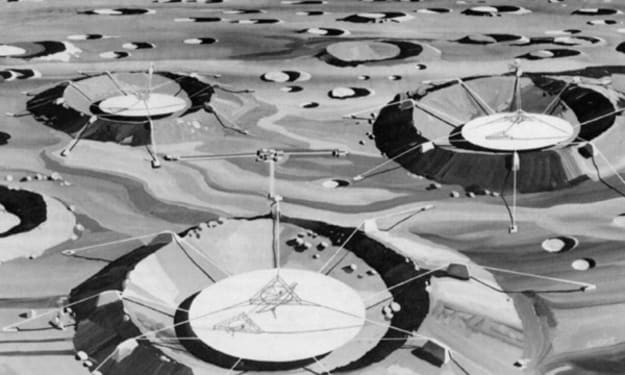Moon Mining and Commercialization
Exploring the Frontiers of lunar Resources.

The moon, our closest celestial neighbor, has captured the attention of scientists, entrepreneurs, and space enthusiasts alike. Beyond its scientific significance, the moon presents unique opportunities for commercial activities, such as mining operations and tourism. In this article, we will delve into the prospects of commercial activities on the moon, the legal and ethical considerations surrounding lunar resource extraction, and the potential business models that could shape a future lunar economy.
One of the most exciting prospects of lunar commercialization is the extraction of valuable resources. The moon is believed to harbor various resources, including water ice, rare minerals, and potentially even helium-3, an isotope with potential fusion energy applications on Earth. Mining these resources on the moon could provide a sustainable supply chain for space exploration and future human settlements, reducing the need to transport materials from Earth at great expense.
Water ice, in particular, holds immense value for space activities. It can be converted into breathable air, drinking water, and rocket propellant through a process known as in-situ resource utilization (ISRU). The availability of water on the moon could enable the establishment of sustainable lunar habitats and support long-duration missions. Additionally, the extraction of minerals from the lunar surface could pave the way for the development of advanced technologies and provide economic opportunities both in space and on Earth.
However, lunar resource extraction raises legal and ethical considerations. The legal framework governing commercial activities on the moon is primarily guided by the Outer Space Treaty, which prohibits the appropriation of celestial bodies by any nation. The treaty promotes the peaceful use of space and encourages international cooperation. Nevertheless, it does not explicitly address private or commercial activities on the moon. As space agencies, private companies, and nations explore the possibilities of lunar resource extraction, there is a need for clear regulations and guidelines to ensure responsible and equitable practices.
Ethical considerations also come into play. Balancing the utilization of lunar resources with the preservation of the moon's scientific and cultural value is paramount. The moon has served as a pristine celestial body, offering valuable insights into the history and evolution of the solar system. It is essential to protect scientifically significant areas, such as the Apollo landing sites, from potential disturbances caused by commercial activities. Collaborative efforts between space agencies, scientific communities, and private entities can help establish guidelines for sustainable resource extraction while preserving the moon's scientific and historical heritage.
In envisioning a future lunar economy, various business models emerge. One potential model is the establishment of lunar mining companies that specialize in extracting and processing lunar resources. These companies could operate under public-private partnerships, working in collaboration with space agencies or international organizations to ensure compliance with legal and ethical standards. Another model involves space tourism, where private companies offer lunar surface experiences to individuals willing to explore the moon firsthand. This could include lunar landings, lunar base visits, and even extended stays on the moon. The growth of a lunar tourism industry would not only offer unique experiences but also generate revenue to support further lunar exploration and development.
Furthermore, a lunar economy could involve the development of supporting industries and infrastructure. Companies specializing in construction, manufacturing, and technology could emerge, catering to the needs of lunar settlements and space-based activities. This includes the construction of habitats, the development of transportation systems, and the creation of technologies for resource extraction and utilization. The lunar economy could also foster innovation and drive advancements in areas such as robotics, 3D printing, and sustainable living technologies.
While the vision of a thriving lunar economy is exciting, it is important to approach commercial activities on the moon with caution and responsibility. Collaboration among nations, adherence to international laws, and consideration for ethical and environmental factors are essential for a sustainable and inclusive approach to lunar commercialization.
In conclusion, the prospects of commercial activities on the moon present tantalizing opportunities for resource extraction, tourism, and economic development. The moon's resources, if harnessed responsibly, could support future space exploration and pave the way for a sustainable lunar economy. However, legal and ethical considerations must be addressed to ensure equitable practices and the preservation of scientific and cultural value.
By embracing collaboration and innovation, we can unlock the full potential of the moon and embark on a new chapter of human presence and economic activity in space.
About the Creator
Enjoyed the story? Support the Creator.
Subscribe for free to receive all their stories in your feed. You could also pledge your support or give them a one-off tip, letting them know you appreciate their work.





Comments
There are no comments for this story
Be the first to respond and start the conversation.